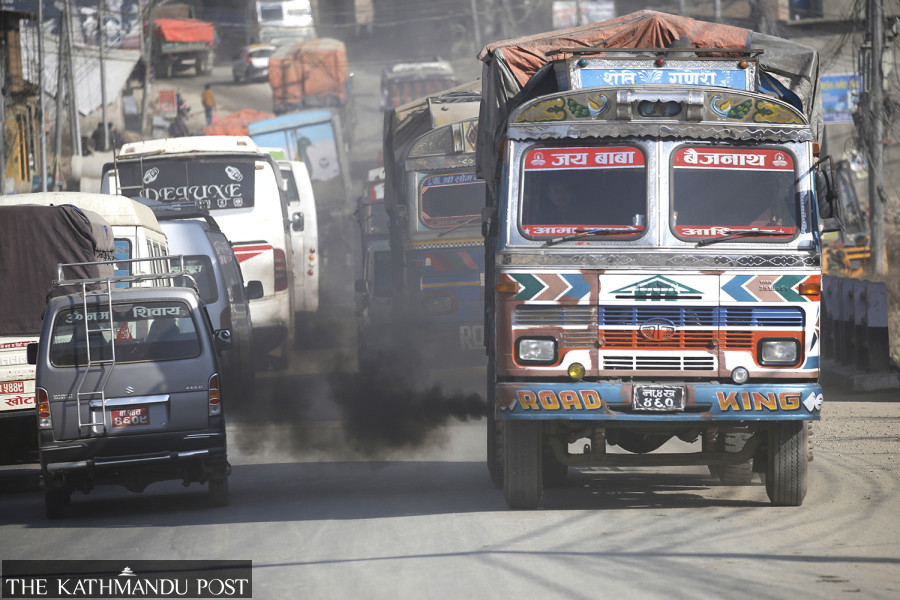Valley
KMC detains over 20 vehicles overnight for emission violations
Of the 1,744 vehicles so far checked, nearly two-thirds of diesel vehicles and 19 percent petrol vehicles failed emission tests.
Post Report
The Environment Department of the Kathmandu Metropolitan City recently detained over 20 high-polluting vehicles, which were fined and released only after engine repairs.
Officials at the department had warned of stern actions, including prohibiting polluting vehicles from plying the streets a month ago, as many vehicle owners and drivers did not take the metropolis’ warnings seriously.
“We have already detained over 20 high-polluting vehicles for ignoring our warnings,” said Jagatman Shrestha, traffic expert adviser at the Kathmandu Metropolitan City office. “Those vehicles were detained overnight. We took written commitments from vehicle owners to carry out engine maintenance regularly, slapped fines, and sent the vehicles to workshops for maintenance.”
Although vehicle emission testing is mainly the responsibility of federal agencies, the constitution also mandates local governments to take measures to reduce pollution, officials say.
The metropolis has developed pollution control guidelines as per the KMC Environment and Natural Resources Protection Act-2021.
Random on-the-spot emissions testing of vehicles has long been a plan of the metropolis to tackle growing air pollution in Kathmandu Valley. The city office started carrying out emissions testing on January 13 in coordination with the traffic police, and the federal Department of Environment and the Department of Transport Management.
Of around 1,744 vehicles which underwent emission testing so far, around 63 percent of diesel vehicles—buses, micro-buses and pick up trucks—operating on Kathmandu’s roads have been found emitting black smoke beyond permissible levels. Likewise, 19 percent of petrol vehicles have also failed the testing.
Some of the vehicles failed the KMC’s emission testing on the same day they received a green sticker from the Department of Transport Management, according to officials. They suspect vehicle owners might also have tricked the system by keeping fuel levels low to show less smoke.
In the initial stage, the metropolis carried out testing for raising awareness and warned drivers and owners to keep their vehicle engines in good condition to avoid fines and legal action, and had obtained written commitments from vehicles that failed the initial test.
Later, it slapped Rs1,000 fines on drivers of polluting vehicles for ignoring warnings from the city office to carry out timely engine maintenance.
“We have been carrying out emission testing of vehicles on a regular basis,” said Sarita Rai, chief of the department. “Despite the warning and action taken against the polluting vehicles, much has not changed. Vehicles have been emitting fumes beyond permissible levels. But we will continue our job [emission testing].”
The city office had also taken six polluting diesel vehicles under its control and released them after a few days with written commitments from the owners to ensure they do
Metropolis officials say more problems have been found in vehicles older than 20 years. The government has announced several times its intention to ban vehicles older than 20 years throughout the country to reduce traffic congestion, air pollution, and road accidents caused by old vehicles. However, the decision has not yet been implemented.
Meanwhile, the city office said it would soon enforce mandatory rules to keep vehicles and their seats clean, in response to passenger complaints about harassment and misbehaviours by drivers and their helps. Officials say they are aware of the harassment passengers encounter in public vehicles.




 13.12°C Kathmandu
13.12°C Kathmandu












